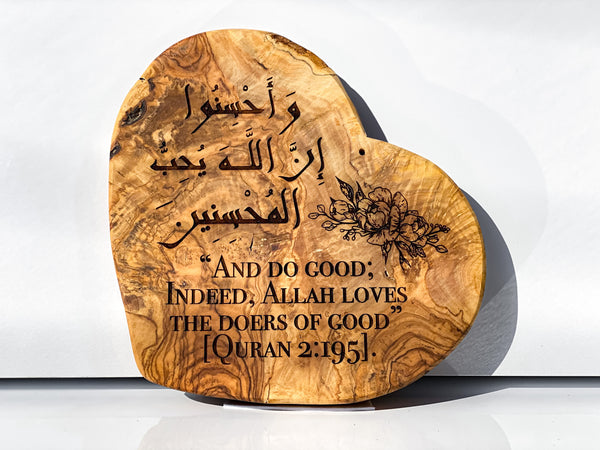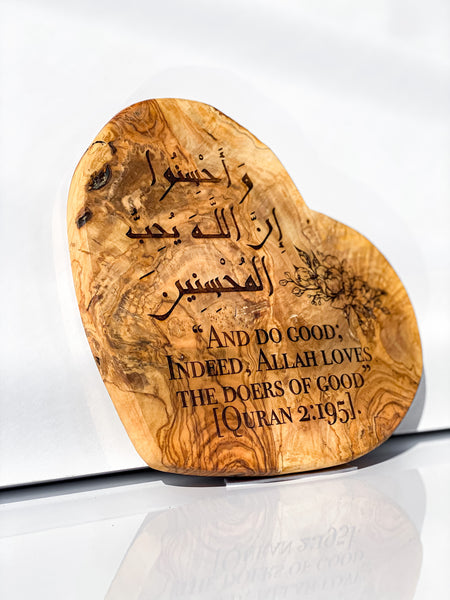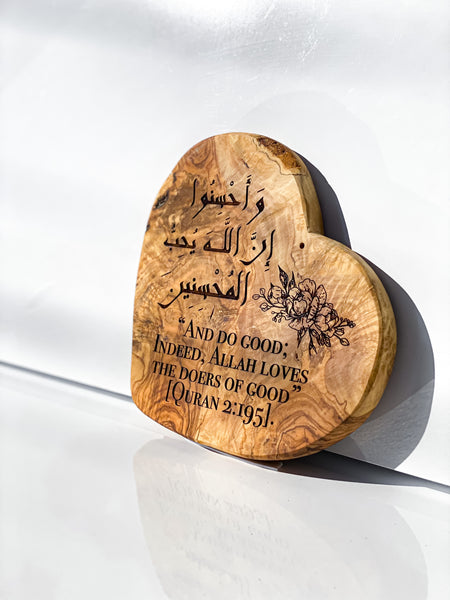The Good Doers - Heart Of Gold (stand included)
وَأَحْسِنُوا ۛ إِنَّ اللَّهَ يُحِبُّ الْمُحْسِنِينَ
Wa-aHsinū, innallāha yuHibbul muHsinīn
And do good; surely Allah loves the doers ofgood
(Sūratul Baqarah, No.2, Āyat 195)
In this verse Allah invites believers to do good, announcing that He loves those who do acts ofgood deeds. Allah loves all His creatures, but the good doers among them receive the special love and pleasure of God.
The MuHsinūn/MuHsinīn or the doers of goodhave been mentioned 32 times in the Holy Quran. Five of these verses occur in Sūrat Yūsuf (Q 12: 22, 36, 56, 78 & 90) referring to Nabī Yūsuf (Joseph) as a doer of good. Imam Ja‘far al-Sādiq (a) talked about why Nabī Yūsuf was described a good doer. In a Hadith quoted in Wasāilush Shī‘ah, Vol. 8, Pg. 40, the Imam mentions that the following three qualities ofProphet Yūsuf were liked by Allah and classified him as being from among the good doers:
1) He made room for whoever entered into a gathering that he was part of. This might seem like a small action but it said a lot about his character. He did not want anyone to feel intimidated at joining due to lack ofspace. Someone who paid attention to such a seemingly small gesture must be very attentive in other matters too. The action spoke of the nobility and magnanimity of his character. It was recognition of the rights of others in society, a recognition that should be applied to other aspects ofsociety. In the Holy Quran the Almighty instructs the believers about this: O Believers! When you are told, ‘Make room,’ in gatherings then do make room; Allah will make room for you (Q 58:11). Imam al-Sadiq (a) has said: three things will prove your friendship to a fellow Muslim brother: welcoming him warmly, making room for him in gathering when he comes, and addressing him with names that is dearest to him. (Mishkatul Anwār, H. 1172, p. 510)
2) He procured loans for the financially needy. He helped those he was able to help financially. For those whom he could not help himself, he assisted them in finding other resources. The Holy Prophet (s) said: I saw inscribed on the gate of the Paradise that the reward of charity is tenfold and reward of giving loan is eighteen times. I inquired from Jibra’īl, why was it so; for the one giving charity is not paid back but he who loans expects it to be repaid? So he replied: yes that is the case. [Know] that every recipient of a charity is not a needy person, but one who takes a loan really needs it. Thus charity sometimes reaches to the undeserving but the loan only goes to those who need it. This is why giving loan is better than charity (Mustadrak al-wasā’il, 2:490).
3) He helped the weak ones. Nabī Yūsuf tended to those who were weak; in health and physical abilities, in wealth, in knowledge and faith etc. He played many different roles. He was a doctor to the sick, a comforter of the distressed, and a teacher of the ignorant. He helped those who wanted to get married acquire the means for marriage, those who didn’t have homes to get a home. Such actions made him eligible for the status of a muhsin. Abū ‘Abdillāh al-Sādiq (a) has said: Fulfilling the need of a believer is better than setting free one thousand slaves and better than donating one thousand horses loaded (with goods) in the way of Allah (Al-Kāfī, v. 2, H. 2134).
Anyone who does such actions today could also become part of the special group of good doersloved by Allah. Use this verse to motivate you to do as much good as possible so you too may become part of the group.
Sources:
Academy Of Islam
Abū Ja‘far M. Y. Kulaynī, al-Kāfī;
Āyatullāh Nāsir Makārim Shirāzī , Farsi article from the discussions on ‘Lessons from the Akhlāq of Historical Figures’, available online here;
Islamic Seminary, Islam a Code of Social Life;
Group of Scholars, Adāb wal-akhlāq Islamiyyah






